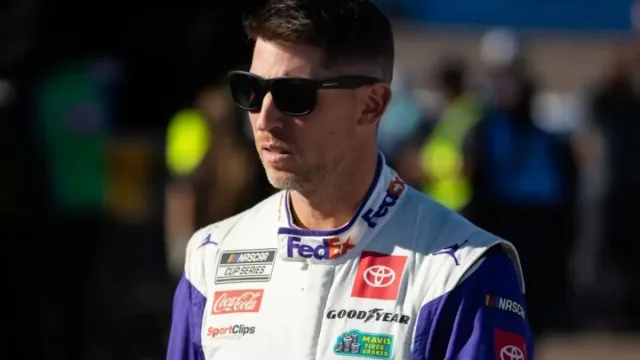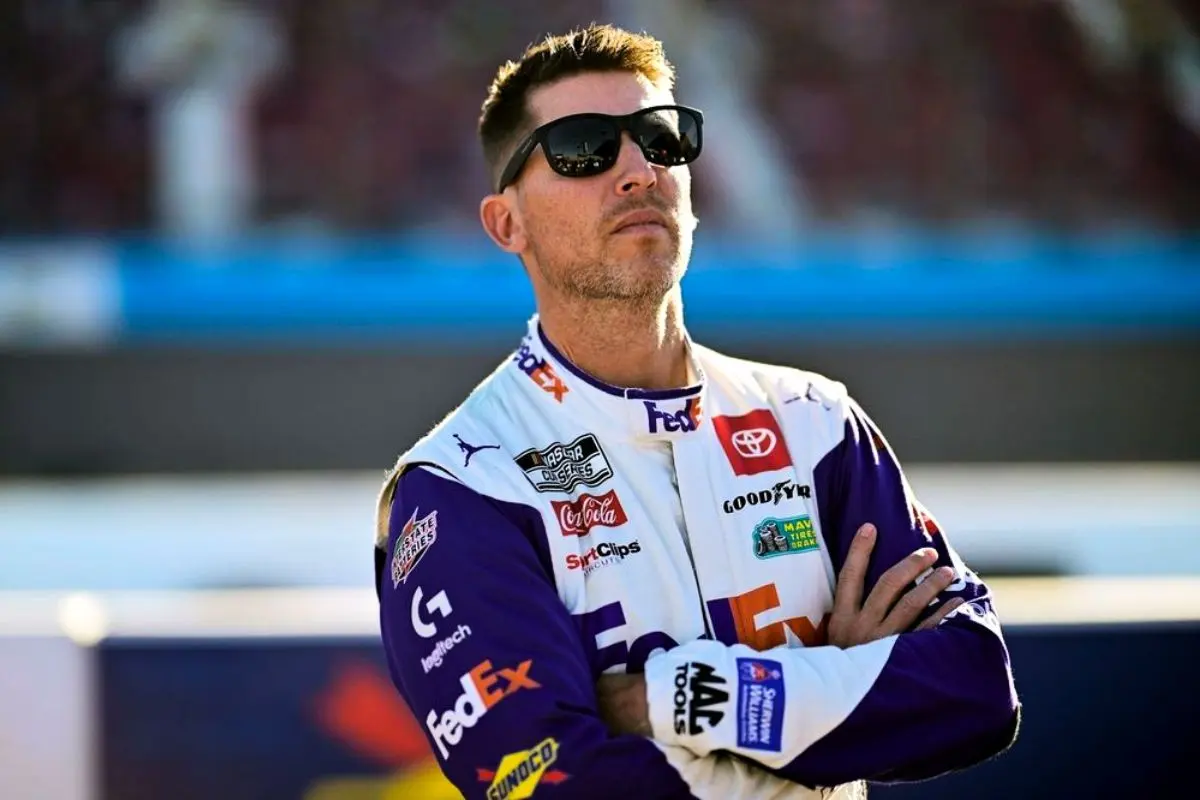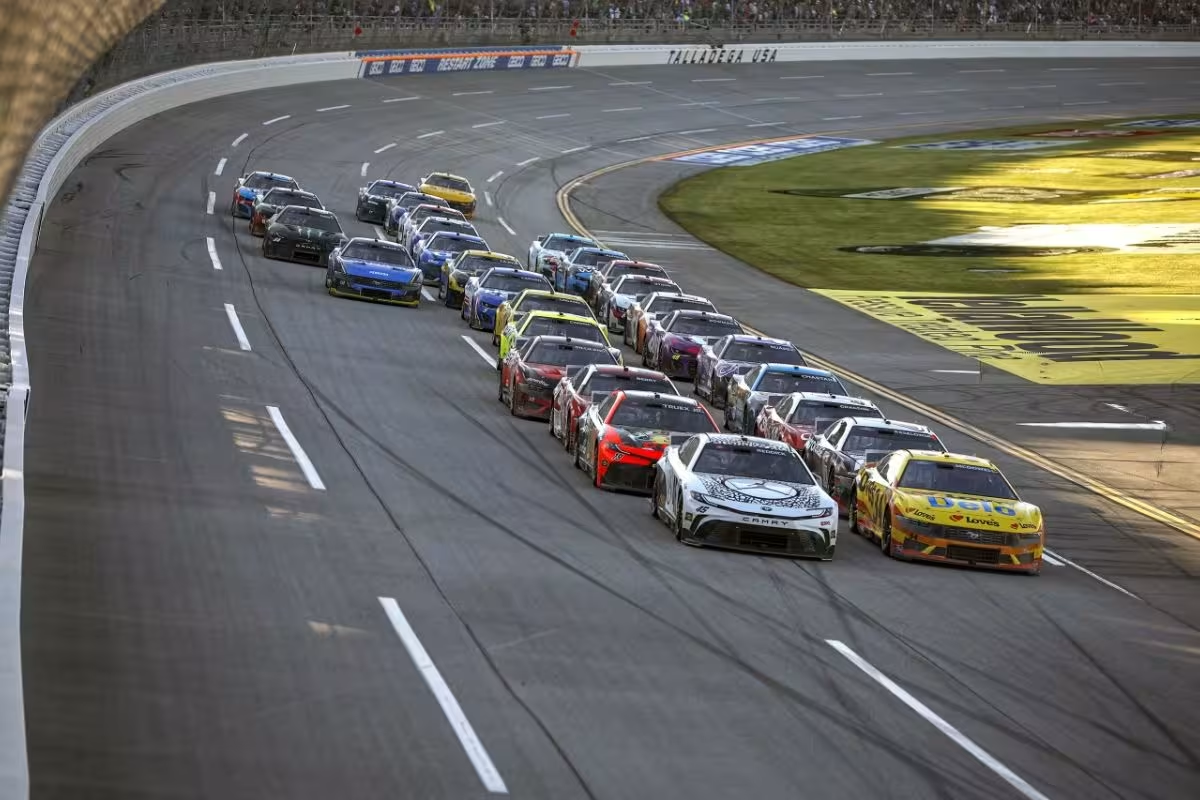Denny Hamlin’s Critical Attack on NASCAR’s Monopoly: Denny Hamlin’s recent critique of NASCAR highlights crucial concerns regarding the league’s charter system, perceived as monopolistic. Amid an ongoing antitrust lawsuit, Hamlin’s comments emphasize frustrations about limited team participation and inflated economic advantages for charter holders. This legal challenge raises questions about innovation and competition within NASCAR, potentially leading to structural reform. The court’s decision to deny a waiver request has intensified the stakes for teams like 23XI Racing and Front Row Motorsports, creating uncertainty about their future operations.
Key Highlights
- Denny Hamlin criticized NASCAR’s charter system, suggesting it creates a monopoly that limits competition and innovation among racing teams.
- His comments on social media reflect growing tensions regarding NASCAR’s governance amidst ongoing legal disputes over monopoly claims.
- The lawsuit challenges NASCAR’s charter practices, raising concerns about economic benefits for select franchises and the overall competitive landscape.
- Hamlin’s critique resonates with stakeholders who demand reforms to promote equity and competitiveness in NASCAR’s operational framework.
- The ongoing legal battle could significantly impact team operations and financial viability, particularly for non-chartered entries like 23XI Racing and Front Row Motorsports.
The Antitrust Lawsuit Against NASCAR
The ongoing antitrust lawsuit against NASCAR involves two prominent teams, 23XI Racing and Front Row Motorsports, who argue that the sport’s charter system constitutes a monopoly. This legal challenge centers on the assertion that NASCAR’s charter system restricts competition by limiting the number of teams that can participate in races, thereby consolidating power within a select few franchises.
The plaintiffs claim that this structure not only hinders new entrants into the sport but also artificially inflates the economic benefits for existing charter holders.
The lawsuit depends on allegations that NASCAR’s practices violate federal antitrust laws designed to promote fair competition. By controlling the allocation of charters, NASCAR is accused of engendering an environment where only a limited number of teams can thrive, ultimately stifling innovation and growth within the sport.
This dispute is emphasized by the broader implications of market dominance, as the charter system may diminish the competitive landscape crucial for the vitality of racing.
The lawsuit has gained supplementary attention following a controversial social media post by NASCAR, which featured 2024 champion Joey Logano. The image, depicting Logano celebrating in a seemingly extravagant manner, has been interpreted as a provocative endorsement of the very monopoly that the plaintiffs are challenging.
As tensions escalate, the outcome of this lawsuit could have far-reaching consequences for NASCAR’s operational framework and its long-term viability in the competitive sports arena. The resolution of these claims will be critical in determining the future structure of the sport and its adherence to antitrust principles.
Denny Hamlin’s Response to NASCAR’s Post
Denny Hamlin’s reaction to NASCAR’s recent social media post shows the growing tensions surrounding the ongoing antitrust lawsuit. His comment, “Monopoly cards. Perfect,” on a post featuring 2024 champion Joey Logano holding Monopoly cards, was particularly incisive, reflecting the underlying claims of the lawsuit that NASCAR operates under a monopolistic framework. This comment appears less as a light-hearted jab and more as a serious critique of the very system that is facing legal scrutiny.
The timing of NASCAR’s post has garnered considerable attention, particularly given the context of the legal battles it is currently involved in. The contrast of a playful image with a serious allegation has raised eyebrows among critics and fans.
Importantly, commentator Toby Christie highlighted the irony on X (formerly Twitter), questioning the appropriateness of NASCAR’s choice to promote such imagery amidst an antitrust lawsuit alleging monopolistic practices.
“NASCAR, currently in an antitrust lawsuit against 23XI Racing and Front Row Motorsports who have alleged the sanctioning body of being a monopoly, snapped a shot of 2024 champion Joey Logano holding Monopoly cards. That’s—a choice.” – (Toby Christie)
Hamlin’s remark shows the growing frustration among drivers and teams regarding NASCAR’s governance and operational structure, emphasizing a perceived lack of fairness within the competitive landscape.
View this post on Instagram
Intensified Spotlight on the Lawsuit
Increasing scrutiny surrounding the ongoing antitrust lawsuit has been amplified by Denny Hamlin‘s pointed commentary, further showing the fractures within NASCAR’s competitive structure. The lawsuit has become a focal point for teams dissatisfied with the current governance model, which they argue perpetuates an unfair advantage for select participants.
Hamlin’s criticism of NASCAR’s monopoly-like tendencies resonates with a growing faction of stakeholders who contend that the sport’s rules and financial distributions are skewed, thereby reducing the competitive integrity of the league.
The legal battle is becoming increasingly complex, as teams demand for a reformed system that promotes equity and competitiveness. Hamlin’s remarks have galvanized opinions within and outside the sport, drawing attention to the implications of NASCAR’s charter agreements.
These agreements have recently come under fire, particularly following NASCAR’s actions against teams that opted not to sign them. Such measures only serve to heighten tensions and emphasize the controversial nature of the current operational framework.
Moreover, NASCAR’s promotion of Joey Logano’s championship victory, laden with Monopoly references, has accidentally fueled dissent among critics who see it as representative of the sport’s monopolistic practices.
Court Decision and Impact on 23XI Racing and Front Row Motorsports
A recent court ruling has considerable implications for 23XI Racing and Front Row Motorsports as their request to waive a special clause in the ongoing antitrust lawsuit against NASCAR was denied. The court’s decision leaves both teams in a risky position regarding their participation in the 2025 NASCAR season, as they were hoping to continue racing under the charter agreement while the litigation started.
The charter system, which guarantees certain teams a spot in each race and secures a larger share of earnings, is central to the lawsuit. With the waiver request denied, both teams may now have to compete as “open” entries, greatly diminishing their financial prospects. The consequences of this court decision extend beyond immediate racing concerns; they could reshape NASCAR.
| Aspect | Details |
|---|---|
| Court Ruling | Denied waiver request for special clause |
| Teams Affected | 23XI Racing, Front Row Motorsports |
| Participation Status | Uncertain for 2025 season |
| Potential Entry Type | Open entries (non-chartered) |
| Earnings Impact | Earnings reduced to less than a one-third |
The Uncertainty and Potential Consequences for 23XI Racing
The uncertainty surrounding 23XI Racing‘s future has intensified following the recent court ruling, placing the team in a risky position as they consider the implications of potentially racing as an open entry. This scenario poses considerable financial risks, as the cost of fielding a car could exceed millions each weekend without the benefits of the charter system.
Such a shift could lead to the departure of Tyler Reddick, one of the team’s standout drivers, who holds a contractual clause permitting him to exit if the team operates as an open entry. The loss of Reddick would not only diminish the team’s competitive edge but also dishearten fans who have rallied behind him during the Championship race.
Denny Hamlin, co-owner of 23XI Racing, has acknowledged the ongoing uncertainty, particularly as the championship race in Phoenix approaches. Meanwhile, Bob Jenkins, owner of Front Row Motorsports, has expressed skepticism regarding the financial viability of competing as an open entry, indicating that potential earnings may not cover operational costs.
While the court ruling does not immediately threaten 23XI Racing, it places the team in a delicate position pending the outcome of their appeal. Should they succeed, they may secure more favorable conditions for future seasons.
Conversely, failing to handle this legal scene could result in a loss of their chartered status and considerably impact their long-term viability within NASCAR. The forthcoming Daytona 500 may serve as a crucial moment, potentially showing the detrimental effects of non-chartered competition.
News in Brief: Denny Hamlin’s Critical Attack on NASCAR’s Monopoly
The ongoing antitrust lawsuit against NASCAR has notable implications for the sport’s competitive landscape. Denny Hamlin’s criticisms emphasize the perception of an unfair monopoly within the organization.
The court’s forthcoming decisions will not only affect Hamlin’s team, 23XI Racing, but also other entities like Front Row Motorsports, showing the broader challenges faced by teams operating under NASCAR’s governance. The outcome of this legal battle could redefine the future of competitive equity in the racing industry.
ALSO READ: Denny Hamlin Underestimated Ty Majeski? How the NASCAR Truck Series Finale Changed the Script



